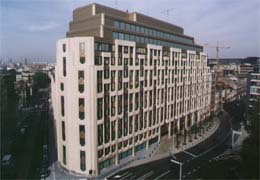
The Commission is the policy engine. It proposes legislation, is responsible
for administration, and ensures that the provisions of the treaties and the
decisions of the institutions are properly implemented. It has investigative
powers, and can take legal action against persons, companies, or member states
that violate EU rules. It manages the budget and represents the Union in
international trade negotiations.
The European Commission is composed by 20 Commissioners of which two are
from France, Germany, Italy, Spain and the United Kingdom, and one for each of
the other member states. They are appointed for five-year terms, in line
with the European Parliament, which approves the appointment of the Commission
as a body.
|
